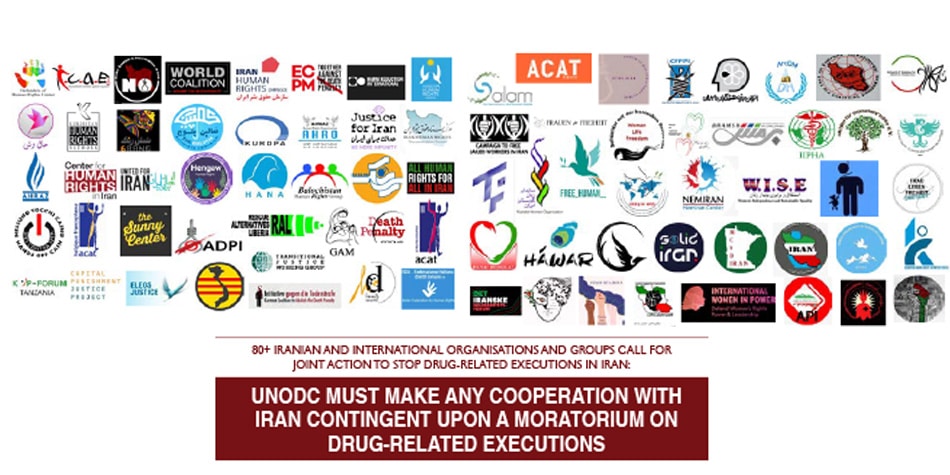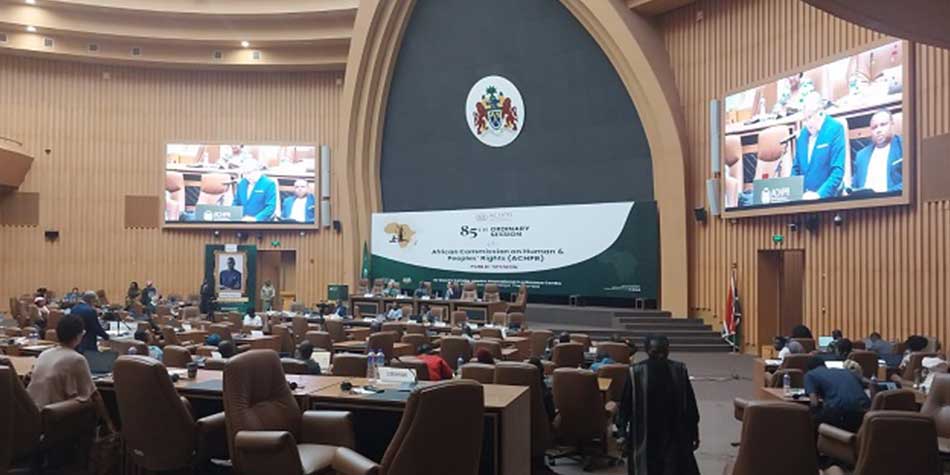
Call for joint action to stop drug-related executions in Iran
Statement
April 10, 2024
Iran Human Rights (IHRNGO) and 83 Iranian and international organisations and groups have called for joint action to stop drug-related executions, urging UNODC to make “any cooperation with the Islamic Republic contingent on a complete halt on drug-related executions”. They have announced the start of a mass international campaign in this regard.
The death penalty or state murder is the Islamic Republic’s most important tool for instilling societal fear to maintain power. Executions in Iran increased dramatically following the “Woman, Life, Freedom” uprising, with at least 834 people executed in 2023.
In 2023, more than half of all recorded executions in Iran were for drug-related charges. At least 471 people were executed without any backlash or political cost for the Islamic Republic. The majority of those executed are from deprived and marginalised communities. The number of executions carried out in the ethnic regions, particularly the Kurd and Baluch, is disproportionally high compared to their population. In 2023, a third of those executed for drug-related charges were Baluch people.
Drug defendants are sentenced to death by Revolutionary Courts based on torture-tainted confessions, without due process and fair trial rights and often without access to a lawyer.
Drug-related executions have not received appropriate international reaction and their daily implementation is met with media silence. This has led to the authorities carrying out 18 times more drug executions in 2023 compared to 2020 with the lowest political cost.
On the other hand, the United Nations Office on Drug and Crime (UNODC) which cooperates with Iran in combating drug trafficking, has not only remained silent about the sharp hike in drug executions, but signed a new agreement with the Islamic Republic in May 2023. In addition to legitimising the state’s use of the death penalty, this cooperation also leads to more executions through financial aid and equipment.
We are concerned that hundreds more will be executed in the coming months if we do not increase the political cost of these executions for the Islamic Republic. We call on all human rights organisations and activists to take part in a special global campaign to stop drug-related executions in Iran.
The aim of the campaign is to echo the voice of the most voiceless victims of the Islamic Republic’s execution and intimidation machine. We also urge the UNODC to make any cooperation with the Islamic Republic contingent on a complete halt on drug-related executions.
Signatories:
- Iran Human Rights (IHRNGO)
- International Committee Against Execution (ICAE)
- Global Campaign to Stop Executions In Iran
- World Coalition Against the Death Penalty
- Defenders of Human Rights Center (Shirin Ebadi)
- Impact Iran
- Ensemble contre la peine de mort (ECPM)
- Harm Reduction International
- Kurdistan Human Rights Association – Geneva
- Haalvsh
- The Baloch Activists Campaign
- Kurdistan Human Rights Network (KHRN)
- 6Rang (Iranian Lesbian and Transgender Network)
- Kurdpa Human Rights Organization
- Ahwaz Human Rights Organisation (AHRO)
- Justice for Iran
- Iran Human Rights Documentation Center
- Association for the Human Rights of the Azerbaijani People in Iran (AHRAZ)
- Center for Human Rights in Iran
- United for Iran (U4I)
- Hengaw Organization for Human Rights
- HANA Human Rights Organization
- Balochistan Human Rights Group
- Rasanak
- All Human Rights for All in Iran
- United to End Executions in Iran
- Siamak Pourzand Foundation
- The Sunny Center Foundation (USA)
- Hands Off Cain
- Abolition Death Penalty of Iraq Organization
- Rescue Alternatives Liberia
- ACAT Belgique
- The Christian Union for Progress and Human Rights, DRC
- Grupo de Apoyo Mutuo, Guatemala
- Death Penalty Focus (USA)
- Key and Vulnerable Population Tanzania (KVP Forum)
- Capital Punishment Justice Project, Australia
- Eleos Justice, Monash University, Australia
- ACAT Germany (Action by Christians for the Abolition of Torture)
- German Coalition to Abolish the Death Penalty (GCADP)
- Federal Association of Vietnamese Refugees in the Federal Republic of Germany
- Transitional Justice Working Group (TJWG), South Korea
- Humanity Diaspo, France
- Italian Federation for Human Rights (FIDU)
- SALAM DHR (Bahrain)
- ACAT France
- Campaign to Free Political Prisoners in Iran (CFPPI)
- Association des Chercheurs Iraniens (ACI)
- ArcDH Human Rights of Azerbaijanis of Iran
- Kanoon-e Khavaran
- NIKA, Network of Iranians for Liberty and Democracy
- Free Them Now
- Frauen für Freiheit e.v
- Solidarität mit der Iranischen Revolution – Frankfurt/Mainz
- Iranian Voices in Frankfurt
- Bramsh – Voice of Balochistan Women
- International Iranian Physicians and Healthcare Providers Association (IIPHA)
- Aktion für Menschenrechte e.V.
- Simorgh; Centre socio-culturel des Iraniens de Québec
- Free Human Association
- Iranian Healthcare Association for Democracy and Human Rights
- Nemiran Center
- Women’s Independence and Sustainable Equality (WISE)
- Stop Child Executions (SCE)
- Hanai Rojhelat
- Alborz, Paris – collectif en soutien au soulèvement “Femme, Vie, Liberté”, France
- Transnational Community Federation e.V
- HÁWAR.help Organization
- Norsk Iransk Råd
- SolidIran Association
- Minnesota 4Iran
- Ensemble pour l’Iran
- Centre Zagros pour les Droits de l’Homme
- Kurdistan Human Rights Reporters Center
- Iransk Solidaritetsforum
- Woman-Life-Freedom, Melbourne
- Feminista Bonn
- Justice Supporters Association
- International Women in Power
- Alliance Path for Iran (API)
- Volunteer Doctors of Kurdistan
- Rev Group Iran
- Frau Leben Freiheit Darmstadt
- Rojhalat Women Organisation







